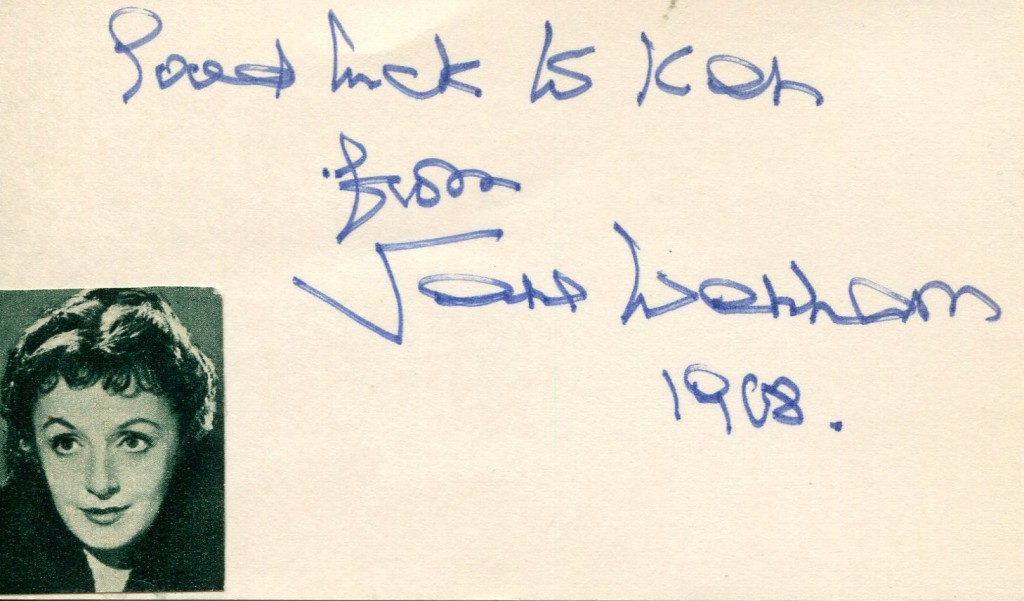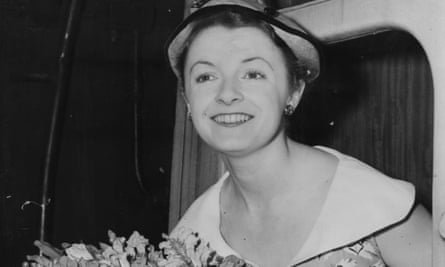
Jane Wenham was born in 1927 in Southampton. She made her film debut in “An Inspector Calls” in 1954. Her other films include “The Teckman Mystery” and “Make Me An Offer”. She has a son Simon from her marriage to Albert Finney. Ms Wenham died in 2018.

Obituary in “The Guardian” in 2018.
The actor Jane Wenham, who has died aged 90, brought a delightful stage presence to work that ranged from Shakespeare to the musical Salad Days and even to pantomime. In fact, Wenham seemed ready for anything.
At the Bristol Old Vic in 1947, her Desdemona in Othello was compared to Peggy Ashcroft’s opposite Paul Robeson 17 years earlier by the critic of the London Evening Standard. When first Wenham opened her mouth to sing, in Julian Slade’s Old Vic version of The Duenna in 1952, in which she later appeared at the Westminster theatre, her soprano voice was rated “the great success of the evening”.
She served her time as Jane, the jolly university undergraduate in Slade’s long-running hit Salad Days; and went on to gather plaudits in such West End shows as Wild Thyme (St Martin’s, 1955), a musical version of Shakespeare’s Comedy of Errors (Arts, 1956), Grab Me a Gondola (Lyric, 1956) and Virtue in Danger (Mermaid and Strand, 1963).

Jane Wenham leaning out of a train carriage as she and the rest of the Old Vic theatre company prepared to tour South Africa in 1952. Photograph: Central Press/Getty Images
The daughter of Dorothy (nee Wenham) and Arthur Figgins, she was born in Southampton and adopted her mother’s maiden name for the theatre. She trained at the Central School of Speech and Drama in London before making her West End debut in 1945 in the great Old Vic revival of Henry IV Part I at the New theatre, with Ralph Richardson as Falstaff. That year she also appeared in a film of the 1943 stage success Pink String and Sealing Wax.Advertisementhttps://4409f2364d31f3e4b6c3748210922e0e.safeframe.googlesyndication.com/safeframe/1-0-37/html/container.html
After visiting New York with the Old Vic company, she returned to London as Gladys in Thornton Wilder’s history of the world in comic strip, The Skin of Our Teeth (1946), but realised that rep training was more important than the West End, so she joined the Bristol Old Vic. Within a few weeks she was praised for the finest Desdemona (to William Devlin’s Othello) for 17 years; and as Ophelia to Robert Eddison’s Hamlet, she transferred to the St James’s theatre in London in 1948.
In two seasons at Bristol, her singing voice caught attention as Aladdin, as Sherah in James Bridie’s Tobias and the Angel and as Cinderella, suggesting “the wistfulness and helplessness of the character”. In Sheridan’s The Rivals, her “piquant and tiny” Lucy won further praise; and after a Vera in Turgenev’s A Month in the Country – “a touching picture of young girlhood shattered in the very act of emerging into womanhood” – in Romeo and Juliet she showed a “wistful, affecting quality which accentuated Juliet’s child-like vulnerability”. As the Times put it: “Even the potion scene she nearly brings off by playing much of it down, as if its terrors were almost too great for her to put into words.”
Wenham in 1949 rejoined the Old Vic at the New theatre in London. Her successes continued in 1950 as a dirty and décolleté Pimple, one of Hogarth’s gin addicts, in She Stoops to Conquer; as a lively, cherry-lipped and bedazzled Katya in A Month in the Country; and as Marianne in Molière’s The Miser. When the company returned to the bomb-damaged Old Vic, she offered a small, fiery and compact Hermia in A Midsummer Night’s Dream in 1951; and in 1953 made “a wise and merry” Nerissa in The Merchant of Venice.
Following a detour to the lyric stage with The Duenna, Wild Thyme and Grab Me a Gondola, it was back to straight Shakespeare. During the 1957 season at Stratford-upon-Avon, she was Celia in As You Like It, Calphurnia in Julius Caesar and Iris in The Tempest. That year she married Albert Finney in Birmingham, where he was appearing in Henry V.
After a stint as Mrs Elvsted to Joan Greenwood’s Hedda Gabler (Arts and St Martin’s, 1964), Wenham returned to Bristol in 1968 for two major roles – as Sister Jeanne in a revival of John Whiting’s The Devils and then as Maggie in Iris Murdoch’s The Italian Girl, which transferred to the West End (at Wyndham’s).
Then she settled down for a long spell with the National Theatre, leaving in 1972 for the Young Vic to play Jocasta in Oedipus, but returning in 1974 to take over (from Jeanne Watts) as Dora Strang in Peter Shaffer’s Equus, at the Old Vic, continuing at the Albery until 1977.
She was unable to resist two even fatter parts at the Northcott theatre, Exeter, in 1978 – the title role in Hugh Whitemore’s Stevie, and Catherine of Braganza in Shaw’s Good King Charles’s Golden Days. Wenham returned to the West End (the Queen’s) as Her Ladyship in Ronald Harwood’s The Dresser in 1980.
Her feature films included An Inspector Calls (1954) and Make Me an Offer (1955), but Wenham was better known for her television roles. She appeared in favourites such as Porridge, Bergerac, Last of the Summer Wine, The Darling Buds of May and Inspector Morse, was Mrs Brittain in the 1979 miniseries Testament of Youth and had a small role in the first series of Downton Abbey (2010), as Mrs Bates, mother of Lord Grantham’s valet.
Wenham is survived by a son, Simon, from her marriage to Finney, which ended in divorce in 1961.
• Jane Wenham, actor and singer, born 26 November 1927; died 15 November 2018
• Eric Shorter died in January this year

